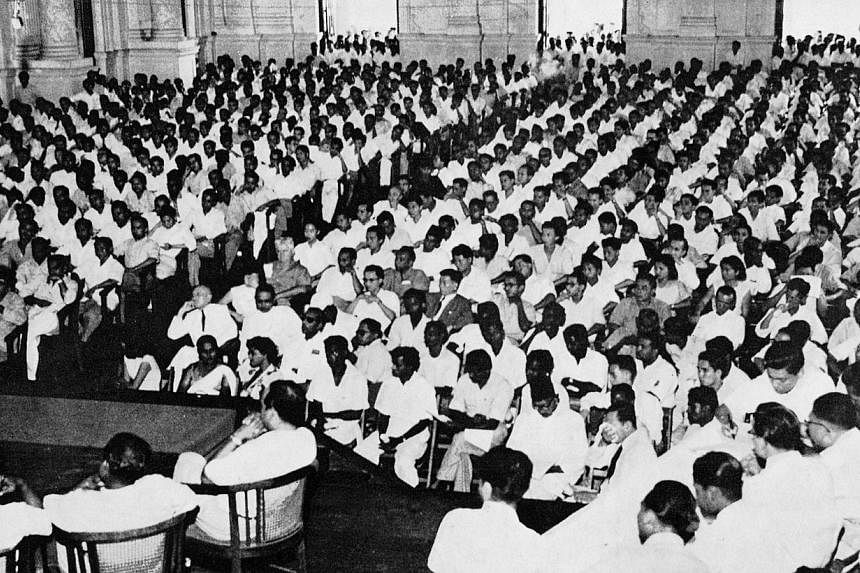What's the significance of the broadcasts?
Mr Lee explains in a new message for the latest edition that the effectiveness of the radio talks was a key reason why the 1962 referendum for merger went decisively in the People's Action Party's (PAP) favour. Mr Lee is one of PAP's founding members. Mr Lee gave a vivid account of the ongoing political struggle over merger. While the context of the radio talks was merger, the key focus of the radio talks was to expose the communists - who they were, how they operated and what their real aims were in opposing merger.
In an essay giving the historical context for the talks, historian Albert Lau, an associate professor at NUS (National University of Singapore), writes that the referendum results cleared the way for the PAP to press on with its merger plans.
Singapore joined Malaysia on Aug 31, 1963, but the merger was short-lived. On Aug 9, 1965, it became independent.
"Having fought so hard for merger, what we did not expect was that in Malaysia, the non-Malays would be treated differently from the Malays," writes Mr Lee in the foreword for the new edition.
"So from a battle for merger, it became a fight for equality between all races in Malaysia."
Why is there a second edition?
"The story of merger, our ejection from Malaysia in 1965 and our subsequent struggles to survive is well-known. Less well-known are the crucial years of 1961-62, when the PAP government was in a precarious position, and the future of Singapore hung in the balance.
"The story is worth retelling," says Mr Lee in the foreword for new edition.
Mr Lee writes that the world and Singapore have changed a great deal since 1961. He hopes the young would read the book and understand what was at stake, why and how the founding leaders stayed the course.
He also urges young Singaporeans to speak to the remaining members of the Pioneer generation who lived through those times. "Without their support in those crucial years, I do not think Singapore would have made it."
What's new in the book?
Apart from a new message from Mr Lee explaining the thinking behind the reprint and why he gave the radio talks, there is also an essay from NUS associate professor Albert Lau giving the historical context for the radio talks.
The historian traces why the PAP formed a united front with the communists, the hazards of this collaboration, their conflicting attitudes towards merger and the break between the pro-communist wing of the PAP and the rest that led to the formation of Barisan Sosialis. "At this stage, the PAP was in the doldrums. It had lost two by-elections in succession. Its organisation was shattered. And, in the Assembly, its position had become precarious in the extreme, clinging on to power by a majority of one. Nevertheless the abrupt ending of its united front with the communists gave the PAP the clean slate it needed to rebuild the party from scratch, this time without communist influence," he writes.
Where were the speeches written?
The first eight speeches were drafted in August 1961 at Cluny Lodge, a Singapore government bungalow in the Cameron Highlands. Mr Lee, in a message for the new edition, explains that he had to be away from the political hurly-burly in Singapore to concentrate on the speeches.
He wrote the last four speeches in between the recording sessions. He revealed that he was exhausted in between broadcasts and would recover his energy by sleeping on the studio floor.
Each of the talks was broadcast in the main three languages on the same evening -- Mandarin at 6.45pm, English at 7.30pm and Malay at 9pm. There were a total of 36 broadcasts, all of which were aired on Radio Singapore in the space of less than a month.
Who helped Mr Lee with the speeches?

His personal assistant Teo Yik Kwee helped take down his dictation when he crafted the first eight speeches. Mr Jek Yeun Thong (above, left) helped Mr Lee with the translation of his broadcasts and gave advice on the pronunciation. Mr Lee also had the assistance of Foong Choon Hon (above, right), the radio producer for Chinese broadcasts.
The medium is the message
The first broadcast was made on Sept 17, 1961 - at a time when there was no other effective medium to reach out to the people. Television broadcast made its debut in Singapore only in February 1963.
"There was no Internet and no social media then -- not even television. I chose the most effective medium available at the time to speak directly to the people. Radio could reach virtually every corner of the island through multi-lingual broadcasts. This was how most people got their news then," Mr Lee writes in the new message.
Reader information

Published by the National Archives of Singapore and Straits Times Press, it is available for S$32.50 (before GST) at major bookstores.
How to order
Visit www.stpressbooks.com.sg or call 63198346 if you wish to order a copy of the book.

